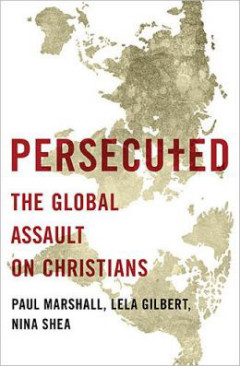
After gathering to protest the Muslim Brotherhood at their suburban Cairo headquarters, several of the demonstrators, mostly Coptic Christians, were dragged by Brotherhood thugs to a nearby mosque after Friday prayers and tortured.
Mosque officials were apparently powerless to stop the hours-long assault, which for one man resulted in a broken skull, broken arm, bleeding in the right eye, and wounds from birdshot.
I learned of the story yesterday morning, moments before attending a panel discussion on the newly released book, Persecuted: The Global Assault on Christians, a project of the Hudson Institute’s Center for Religious Freedom, published by Thomas Nelson.
Scope of the problem
“Religious persecution,” said Nina Shea, who coauthored the book with Paul Marshall and Lela Gilbert, “is the most significant human rights violation in the world, and Christians are the most widely persecuted.” The astonishing breadth of the crisis has been attested to by sources as diverse as The Economist, Pew Research Center, Open Doors, and the Vatican.
Persecuted reveals and details the scope of the persecution in some forty countries.
In places such as Pakistan and Nigeria, vigilante groups and terrorists are the root of the problem, abetted by weak or winking governments. In other countries like Belarus and Turkey, what Marshall describes as a sort of legal suffocation prevails in which codes and restrictions and red tape block any meaningful practice of the faith. In other nations such as North Korea and Saudi Arabia the faith is literally or practically outlawed. More than tallying the statistics of abuse and repression, Persecuted also puts names and faces to the grim numbers.
Freedom of worship is not enough
The panel was moderated by Eric Metaxas, bestselling author of Bonhoeffer and who wrote the foreword to the book. He framed much of the discussion around religious liberty, noting that religious toleration or freedom of worship are inadequate protections.
Freedom of worship allows you to have your rituals for ninety minutes a week, he said, but may well allow authorities to bar expression of the faith outside the narrowly defined practice of worship. Such a freedom is meaningless, as Christianity is by nature pervasive; its tenets and doctrines work their way through a person’s entire life, including such public aspects as work and civic life. A fully realized freedom of religion is the only adequate guarantor of human rights.
Advocacy and prayer
Many nations are far from that reality, but Marshall, Gilbert, and Shea pointed to the recent formation of the nation of South Sudan as a major success for advocates of religious liberty. While religious persecution continues to intensify in Northern Sudan, said Shea, reports of religious violence in the South are nonexistent.
Looking also to the broad political coalition in the late 1990s that established the United States Commission on International Religious Freedom, the panelists drove home the point that advocacy and sustained political pressure produces positive results.
And so, as Gilbert stressed at the end, does another oft-neglected effort. We must not underestimate the value of prayer.
If you don’t know where to begin, Persecuted’s table of contents — which lists each of the offending nations — can double as prayer litany.
Watch Nina Shea discuss the problem and what Christians can do about it here:
Side note: Pray for Nigeria
One nation experiencing an intense level of persecution at present is Nigeria. Last year, over 1,200 Christians were killed in the country, according to the Jubilee Campaign. Attacks include “suicide church bombings, house to house killings, summary roadside executions and random assassinations. . . .” More attacks are expected as we near Easter. Lord, have mercy.
Free download
Download a free chapter of Persecuted here.
















